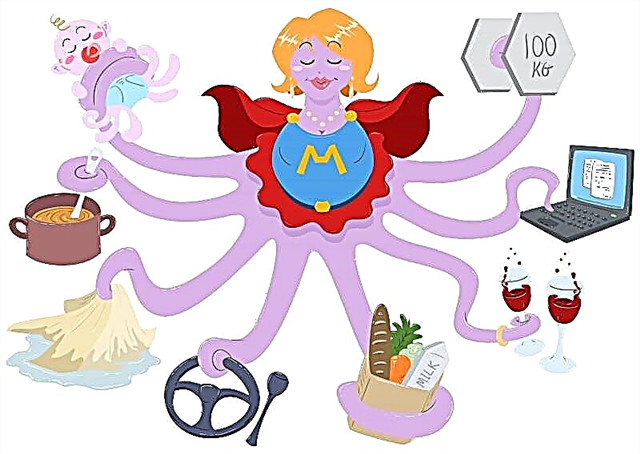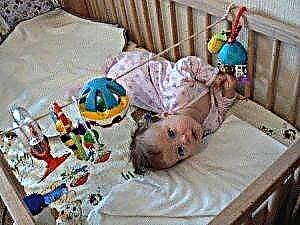So the turn came to one of my "favorite" problems with breastfeeding ... Lack of milk ...
About 9 out of 10 mothers who complain about a lack of milk actually think so unreasonably, focusing exclusively on their own feelings and behavior of the child. But these indicators are biased and are most often explained by other reasons.

There are expressions of moms, like twins similar to each other and you even heard them from your girlfriends or said them yourself. With small variations ...
“My breasts are not filling as before, they are no longer bursting with milk, they have become soft and I feel that they are empty ...”
Usually, such words can be heard from mom at 2-3 months of lactation. Most often, this is due to the onset of the normal stage of lactation - mature lactation. When milk is no longer produced for future use, and the mammary gland adjusts to the needs of the baby and milk comes in exactly as much as it needs for one feeding. Thus, nature has provided an opportunity for the mother's body not to work hard.
An important clarification, the more children a mother has nursed, the faster this moment can come. Once, the mother of the 4th child turned to me! She raised all the children herself! And all the offspring put on well in weight, including the newborn. She said that with each baby, she had less milk and doubted her ability to feed the baby. It turned out that a similar state (the breasts did not fill up, they did not burst, they were soft) came earlier, with the last child, mature lactation was established after a month of feeding. It is wonderful that my mother turned out to be very attentive and balanced, we discussed with her what exactly is happening, that the softness of the breast and the feeling of not fullness does not affect the ability to feed the baby. She now successfully continues to breastfeed.
Therefore, dear mothers, if you notice a change in the condition of the breast and the arrival of milk, do not worry and do not worry. Do not run straight to the pharmacy for a mixture and a bottle, do not drink a bunch of lactogonics, do not start drinking tea with milk in liters (especially since this lactation recipe does not help in any way). Better to relax, look at your happy little one, evaluate if urination, stool frequency and weight gain have changed. If everything is good in this respect, then you have no cause for concern.
We have considered the option if the organization of breastfeeding for the child was correct. But quite often there are situations when significant errors were made in the organization of feeding:
- The baby was supplemented with a mixture, without extreme necessity;
- The kid received a dummy and began to devote a lot of time to it;
- Night feeds were skipped (importance of night feeds);
- Mom kept the intervals between feedings or limited sucking time;
- The crumb was supplemented with water in large volumes.
In this case, it is by this age of the baby that mistakes begin to make themselves felt. And milk production can actually decrease. And in this case, if the mistakes are not eliminated, lactation will not regain its full strength, even despite the constant use of lactogonic agents.
“Everything was fine, but in the morning I woke up, and there was nothing to feed! The milk is gone! ”
Let me tell you right away, mothers, if you were breastfeeding normally before, then milk cannot go anywhere overnight, even in a week, it cannot disappear anywhere! Lactation is a hormonal process and it is not so easy to stop it. Even if you are faced with such a phenomenon, remain calm, do not grab the bottle, try to relax and apply your baby more often during the day. The baby will definitely increase the production of milk by sucking and everything will work out.
Let's go further ...
“I have lactostasis and the baby does not want to breastfeed, probably the milk has burnt out or became tasteless” or “I am afraid to feed the baby due to stagnation”
First aid for any lactostasis is sucking the child and the more often he does it, the faster you, together with the baby, will cope with it. If you have the first signs of lactostasis, start applying the baby to this breast more often. After all, if you feed less with a sick breast, then the nipple and areola will swell more and more and it will be more difficult for the baby to grab the breast well and free it from stagnant milk. That is why, most often, the baby refuses to take it.
Sometimes it happens that due to stagnation, the milk acquires a salty taste and the mother, having tried it, is afraid to feed her baby with such milk. In fact, such milk is not at all dangerous for the baby, just during stagnation, the level of salts in the milk increases, and it acquires such a taste. You can and should feed! After elimination of lactostasis, taste is completely restored.
“I tried to express, but nothing came of it” or “I have no milk, only 40 grams from two breasts!”
The amount of expressed milk is not an indicator of a lack of milk and should not be guided by. And there are explanations for that.
Firstly, even the coolest breast pump cannot be compared to the natural sucking of a baby, the power of the vacuum when sucking a baby and the natural wave-like movements of the tongue make it easy and simple to suck milk from the breast. The mammary gland readily responds to the sucking of a native baby, its closeness and smell, and it gives off milk itself, the milk reflex is turned on and the milk is thrown into the baby's mouth. And when expressing, it doesn't matter if you do it with your hands or with the help of a breast pump, this reflex may not work and you cannot express a large amount.
Secondly, in any business you need a skill and this skill also needs to be learned. Therefore, if for some reason you could not express any significant amount of milk, this is not a reason to get upset, draw far-reaching conclusions and plan a trip to get the mixture.
“My baby hangs on his chest or sleeps for a short time and again asks for a breast. I probably don't have enough milk. "

The fact is that for a human baby, frequent feedings are biologically justified. Our species of mammals, and whatever one may say, this is so, refers to those species that practically do not part with the child, carry him with him, feed him at every desire to attach to the mammary gland.
A woman's breast milk contains easily digestible fats that are digested rather quickly. The record time it takes for breast milk to be digested is just 30 minutes. Therefore, the frequent requirement of the breast is the normal behavior of the infant during the first months of life. And this is not an indicator of a lack of milk.
Do not discount the fact that for a newborn baby, breast is, without exaggeration, everything! This is a way to communicate with mom, to feel comfort, safety, closeness, a way to empty the intestines and get rid of discomfort, some babies pee when they suckle. With the help of the breast, the baby adapts to the new environment after birth, it is a thread that connects the baby and the mother, like an umbilical cord in the tummy, this is a natural continuation of pregnancy and childbirth. Therefore, frequent feedings are important for both the mother and the baby, especially during the first months of feeding.
"The baby is worried under the breast, crying and it seems to me that he is crying because I have little milk."
In fact, the reasons for this behavior, a cart and a small cart, and far from in the first place are the feeling of hunger and lack of milk.
Let's note just a few of them, in fact, there can be a great many more and it is better to deal with the reasons individually.
- If the baby is sometimes supplemented from a bottle, then at a certain stage he purposefully begins to demand it. May also touch the dummy;
- The baby is uncomfortable to suck or something hurts him;
- Feeding errors, such as changing breasts too often (how to breastfeed your baby correctly);
- Changes in milk flow, some babies do not like too much milk flow, others slow it down. This can and should be fought against;
- Banal colic;
- The baby was forced to wait too long for the breast, and he is no longer able to cope with the resentment and can bend and refuse the breast;
- Breast refusal for various reasons not related to a lack of milk.
As you can see, the baby may not behave this way because you do not have enough milk, this is the last, not the first, that you should think about in such a situation.
“The child does not sleep at all during the day! And if you give the mixture, it pounces on the bottle and after the mixture falls asleep for several hours! "
And again the conclusion is drawn - there is not enough milk, it is not as it should be, it is not fatty, not nutritious, etc.
When talking with mom, it almost always turns out that the baby falls asleep in her arms and can sleep for an hour and an hour and a half, but when she tries to put it in the crib, she instantly wakes up and everything starts in a circle (we read an article on this topic: the child sleeps only in his arms, but put wakes up - problem or not). Or the child inevitably wakes up when trying to vilify him with a column and then long lying down, motion sickness and other delights follow. Important to understand that a small person, in order to feel safety and security, needs to feel the warmth, smell and closeness of his mother, and not only when he is awake. This is natural and normal for him. A sling usually helps to solve the problem of a baby's sleep and mobility of a mother. And he is gaining more and more popularity with nursing mothers.
However, many mothers, receiving a message from the older generation: "Do not teach to hands!" and wanting to take a break from wearing it on their hands, they begin to give a mixture and are amazed that the baby can sleep for 3 hours without waking up. Some mothers perceive this as a blessing and begin to doubt the need for breastfeeding in principle. But here you need to dig deeper and figure out why, is this happening? And the trick is that the mixture contains foreign protein, due to which, the mixture is absorbed more slowly and harder, the child falls into a deep sleep, not because he feels good and is full, but because all his strength is spent on digesting the mixture. In addition, the baby, when sucking the bottle, often sucks on it while the mixture continues to pour, as a result, it can overeat great, then sleep can go into a stressful stage. I think every mother understands that this is not good.

Another way out of their situation, which mothers find, is to send the toddler for 3 hours for a walk with dad or grandmother. And everything seems to be fine too, the bobblehead is sleeping on the street, mom is resting. But upon coming home, the child clings to the chest with a stranglehold and may not let go of it for several hours, fearing to lose it again. To prevent this from happening, in the first months of feeding, it is better if the walks last no more than an hour.
Dear mothers, when you start to complain that the baby does not get away with you, does not sleep without you, hangs on your chest, that you do not have time for anything around the house, please remember that time is very fleeting and with this baby this will not happen again. That your child will be small only once and that he needs you so badly, he will only now.
“In the morning the breast is bursting with milk, but by the evening there is little milk and the baby is worried at the breast. So there is not enough milk? "
In order to understand what is happening, you need to know the physiology of lactation. It is during the night and early morning hours that the peak in the production of the lactation hormone prolactin occurs, and milk is produced actively. In addition, during the night feeding, as a rule, less often than during the day, milk accumulates and in the morning it makes the breast burst. During the day, the baby has a lot of reasons for applying, feedings become more frequent, the breast is emptied more often. This does not mean at all that there is no milk or there is not enough milk, it just does not accumulate and its flow weakens somewhat. This can be unnerving for the little one, especially if he sometimes gets a bottle or pacifier. Such children really do not like a weak flow, if you eliminate the foreign objects of sucking, the situation will gradually return to normal.
Usually, by the evening, the crumbs accumulate fatigue, impressions of the day, the babies are getting ready to go to bed, and therefore in the evenings you can often observe that mothers are fed non-stop. It is important to understand that this behavior is, as usual, normal.
Sometimes, too restless behavior in the evenings, can be a consequence of difficult childbirth, stimulation during labor, pain relief. Also, in rare cases, it makes sense to seek help from an experienced osteopath.
As you can see, evening "hangouts" on the breast are not explained by a lack of milk, but by completely different reasons, for example, the peculiarities of lactation and the baby's nervous system.
So, dear mothers, we went through common situations and concluded that it is impossible to base our suspicions about a lack of milk only on our own feelings and behavior of the baby. More often than not, these suspicions are completely unfounded.
If the anxiety does not leave you, do not count it as work, track the amount of urination of the child per day, analyze the dynamics of weight gain, this will save you and your baby from unreasonable feeding. If you are not satisfied with the results, you can assume a real milk shortage, try to pay attention to the correct application, the frequency of feeding, and think about introducing supplementary feeding, if necessary.
How to increase lactation of breast milk at home (folk remedies and pills) - https://razvitie-krohi.ru/kormlenie-grudyu/kak-povyisit-laktatsiyu-grudnogo-moloka.html
How to restore lactation - 10 main recommendations - https://razvitie-krohi.ru/kormlenie-grudyu/kak-vosstanovit-laktatsiyu-10-glavnyih-rekomendatsiy.html
Fundamental advice to nursing mothers about breastfeeding - https://razvitie-krohi.ru/kormlenie-grudyu/grudnoe-vskarmlivanie.html
***



